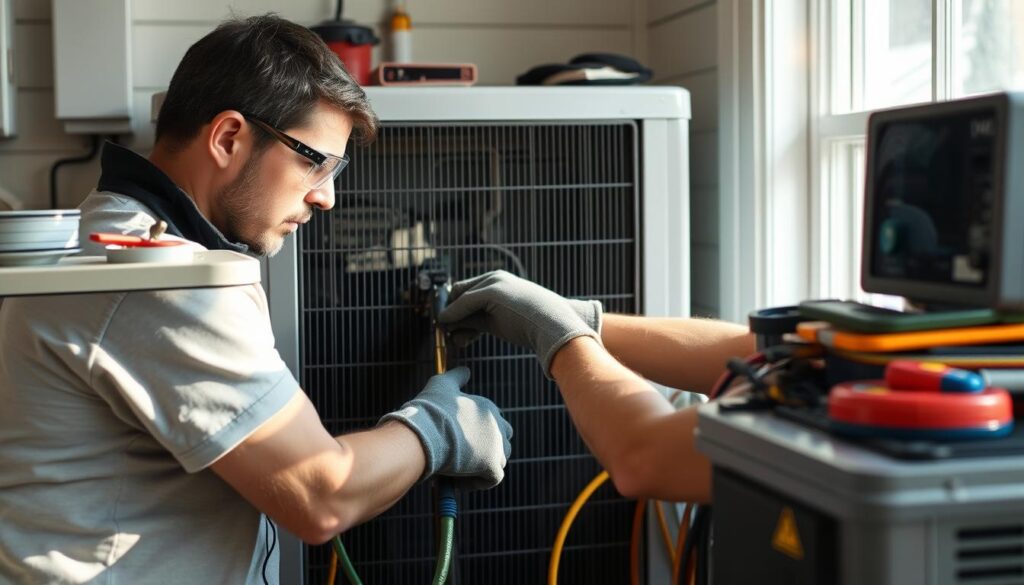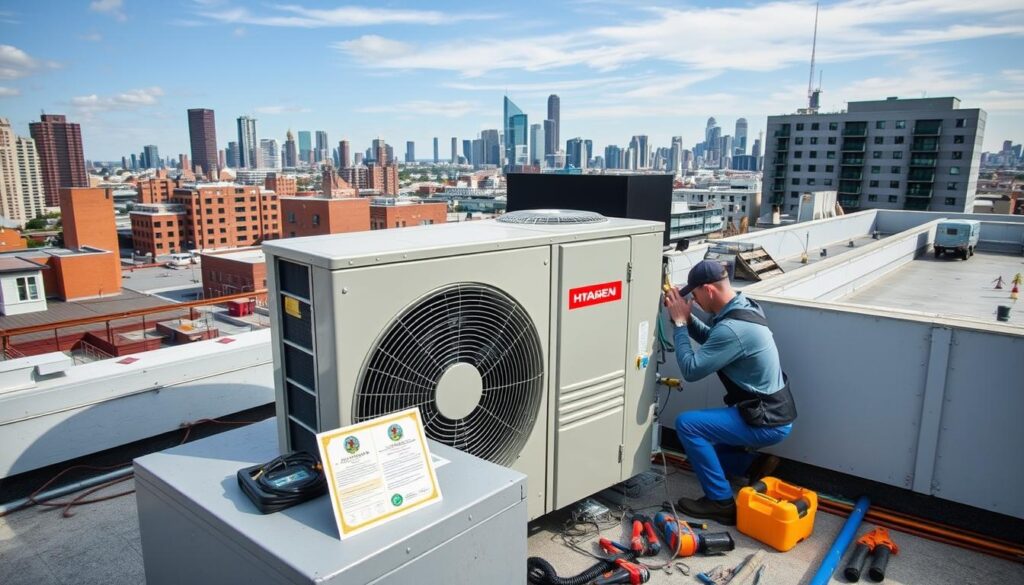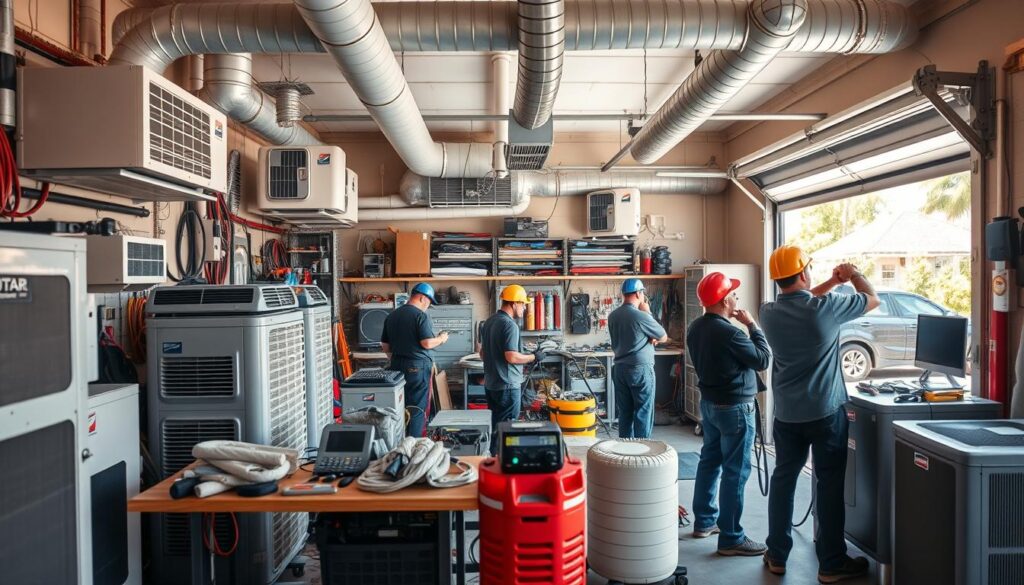Affiliate Disclosure
HVAC Guide Guys is a participant in the Amazon Services LLC Associates Program, an affiliate advertising program designed to provide a means for sites to earn advertising fees by advertising and linking to Amazon.
Can You Do HVAC With a GED? Thinking about a career in HVAC (Heating, Ventilation, and Air Conditioning)? Wondering if a GED is enough to start? The answer is yes, you can definitely begin an HVAC career with a GED. This guide will cover the educational needs, training options, and job chances for HVAC techs, no matter your school history.

Key Takeaways:
- HVAC technicians can start their careers with a GED or high school diploma.
- Training programs, apprenticeships, and certifications are more important than a college degree in the HVAC field.
- HVAC is a growing industry with strong job prospects and competitive salaries.
- Hands-on skills and technical knowledge are essential for success as an HVAC technician.
- Licensing and certification requirements vary by state, but can be obtained through training and experience.
Table of Contents
Understanding HVAC Career Fundamentals
As an HVAC technician, you’ll work on heating, ventilation, air conditioning, and refrigeration (HVAC-R) systems. These systems are in many places, like homes, offices, hospitals, and factories.
What HVAC Technicians Actually Do
Your daily tasks might include:
- Installing new HVAC-R systems, including wiring and electrical components
- Performing routine maintenance and cleaning on existing systems
- Diagnosing and repairing malfunctioning parts or systems
- Testing and inspecting HVAC-R equipment to ensure proper operation
- Evaluating electrical components and troubleshooting issues
Common Work Environments
You might work in various settings, such as:
- Residential homes
- Commercial buildings (offices, schools, hospitals, etc.)
- Industrial facilities (factories, warehouses, etc.)
- Retail stores and other public spaces
Types of Systems You’ll Work With
You’ll work with different heating and cooling systems, like:
- Central air conditioning systems
- Furnaces (gas, electric, or oil-fired)
- Heat pumps
- Boilers
- Refrigeration units
Knowing the basics of these HVAC-R systems is key to doing well in this job.
Explore Our HVAC Shop
Looking for top-rated HVAC tools, parts, and accessories? Visit our shop and find the perfect solution for your needs.
Visit the ShopCan You Do HVAC With a GED?
Yes, you can start an HVAC career with a GED. While a high school diploma is common, a GED can still lead to this field. It’s in high demand.
The HVAC industry is growing fast, with a 15% increase expected by 2026. HVAC jobs are growing faster than many other jobs in the U.S. Training takes about nine months, or three to five years for apprenticeships.
To start with a GED, focus on vocational training, physics, and math. These courses are key. Employers also value certifications like the NATE Ready to Work Certification. It shows you’re ready for entry-level work.
Even with a GED, more training can help you stand out. Going to a trade school or doing an apprenticeship can boost your career. It makes you more competitive in the HVAC field.
“Most HVAC programs require applicants to have a high school diploma or GED equivalent, and training can range from six months to two years.”
Success in HVAC depends on skills and certifications, not just education. With the right training, a GED won’t hold you back. You can have a fulfilling HVAC career.
Explore Our HVAC Shop
Looking for top-rated HVAC tools, parts, and accessories? Visit our shop and find the perfect solution for your needs.
Visit the ShopEducational Requirements and Training Paths
After getting a high school diploma or GED, you can start your HVAC technician journey. Trade schools and community colleges offer programs that last from 6 months to 2 years. These programs give you both classroom learning and hands-on experience in HVAC systems.
For more experience, consider apprenticeships. These programs, backed by unions or contractor groups, last 3 to 5 years. They mix theory with practical training under the watch of seasoned HVAC techs.
Certification Requirements
HVAC techs need the right certifications to work. The EPA Section 608 certification is key for those handling refrigerants. It comes in four types, based on the equipment you’ll work with.
Licensing rules for HVAC techs vary by state. For example, Virginia has Apprentice, Journeyman, and Master licenses. Each has its own set of requirements and exams.
| HVAC Training Path | Duration | Certification Required |
|---|---|---|
| Trade School/Community College | 6 months to 2 years | EPA Section 608, State-Specific Licenses |
| Apprenticeship Program | 3 to 5 years | EPA Section 608, State-Specific Licenses |
In summary, you have many ways to become an HVAC tech. You can choose from trade schools, community colleges, or apprenticeships. No matter your path, getting the right certifications, like EPA Section 608 and state licenses, is crucial for a career in HVAC.
Skills and Qualifications Needed for Success
To be a top HVAC technician, you need a mix of skills and qualifications. This field is dynamic, requiring both technical know-how and soft skills.
HVAC techs must understand HVAC systems, electrical work, and mechanics well. They should know about refrigeration, air conditioning, heating, and ventilation. They also need to read blueprints and solve system problems.
- Excellent customer service skills to interact with clients effectively
- Attention to detail to ensure accurate measurements and installations
- Math skills for equipment sizing, system calculations, and data analysis
- Time management abilities to juggle multiple tasks and meet deadlines
- Physical strength and stamina to handle the demands of the job
Successful HVAC techs also have strong problem-solving, communication, and adaptability skills. They must think critically, troubleshoot, and solve client problems effectively.
Getting industry-recognized certifications can boost your career. Look into certifications from the Air-Conditioning Refrigeration Institute (ARI) or North American Technician Excellence (NATE). Also, keep up with new HVAC technologies and best practices through ongoing learning.
“The best HVAC technicians are those who combine technical expertise with excellent customer service and problem-solving abilities. These skills are essential for success in this dynamic industry.”
By focusing on the right skills and qualifications, you can have a fulfilling HVAC career. With the right training and hard work, you’ll be a key player in keeping homes and businesses comfortable and efficient.
Explore Our HVAC Shop
Looking for top-rated HVAC tools, parts, and accessories? Visit our shop and find the perfect solution for your needs.
Visit the ShopHVAC License Requirements in Different States
Getting into the HVAC field means knowing the licensing rules vary by state. It’s key for those starting out to grasp these rules. This ensures they can legally work in their chosen field.
State-Specific Regulations
Every state has its own HVAC licensing rules. These include education, work experience, exams, and insurance. For instance, California demands a C-20 license for jobs over $500. They also require specific experience and exams.
New Jersey has its own rules. Contractors need a master HVAC license or work under a licensed pro to do HVAC work legally.
EPA Certification Details
HVAC techs must also get an EPA Section 608 certification. This exam checks their knowledge on refrigerant handling. It’s a one-time test that keeps the environment and customers safe.
Continuing Education Requirements
To keep their licenses, HVAC techs must take ongoing courses. They need to complete hours or credits of approved classes. This keeps them updated with the latest in HVAC.
The HVAC industry is booming, set to hit $82.5 billion by 2026. Knowing the licensing rules in each state helps new techs succeed. It ensures they follow the law and are well-prepared for their careers.
Career Growth and Advancement Opportunities
As an HVAC technician, you have many chances to grow in your career. With hard work and experience, you can take on more duties and earn more money.
You can move up to supervisory roles, leading teams and handling big HVAC projects. Or, you could become a project manager, overseeing the setup and upkeep of big HVAC systems in businesses or factories.
You can also specialize in certain HVAC areas, like commercial refrigeration or solar panel work. Getting extra certifications in these fields can make you more valuable to employers and lead to better pay.
If you dream of being your own boss, starting an HVAC business is an option. With the right skills and business knowledge, you can create a thriving HVAC company.
Keeping learning and growing in your HVAC career is crucial. Getting more education, like an associate’s or bachelor’s degree in HVAC technology, can lead to better job opportunities. Getting certifications from North American Technician Excellence (NATE) or HVAC Excellence can also boost your skills and pay.
“Advancements in the HVAC industry involve the installation of new, cost-effective, and energy-efficient systems, driven by technology innovations and the increasing demand for green building solutions.”
The HVAC field is always changing, with a focus on green and energy-saving systems. By keeping up with new tech and trends, you can become a key player in your field. This will help you advance in your HVAC career and professional development.

Explore Our HVAC Shop
Looking for top-rated HVAC tools, parts, and accessories? Visit our shop and find the perfect solution for your needs.
Visit the ShopSalary Expectations and Job Outlook
Thinking about becoming an HVAC technician? It’s key to know the salary and job outlook. The HVAC field offers good pay and growth, making it a great career choice.
Entry-Level Salary Ranges
The U.S. Bureau of Labor Statistics (BLS) says HVACR technicians made $57,300 a year on average in May 2023. But, newbies start with lower pay. As they gain experience, their earnings can rise.
In 2019, HVAC techs made about $49,630 on average. This shows that with more experience, you can earn more.
Experienced Technician Earnings
Experienced HVAC techs with special skills earn more. They know safety rules, can fix different equipment, and have certifications. They also get extra pay for working in tough places or on special projects.
Geographic Pay Variations
The highest salaries for HVAC techs were in places like the District of Columbia, Alaska, and Massachusetts. Hawaii and Minnesota also paid well. Techs in big cities or expensive areas make more than those in rural areas.
From 2018 to 2028, HVAC tech jobs are expected to grow by 10%. This is faster than most jobs, thanks to the need for HVAC system upkeep. It’s a secure career path for HVAC techs.
Starting Your Own HVAC Business
If you’re an experienced HVAC technician, starting your own HVAC business can be rewarding. About 8% of HVAC pros are self-employed, running their own entrepreneurship ventures. This path offers higher earnings but also more responsibilities and risks.
To succeed as an HVAC business owner, you’ll need skills beyond technical know-how. You’ll need to manage finances, market your business, and build strong customer relationships. You’ll also have to deal with licensing and regulations that vary by state.
In some places, like Oregon and Alaska, HVAC techs need separate licenses for residential and commercial work. Refrigeration techs must get a special license, which includes formal training, passing an exam, and EPA certification.
Starting an HVAC contracting business might need at least one equity partner in some states. Or, you might need a license if you’re the sole owner. Being good at finance and marketing is key for self-employment success in HVAC.

If you’re thinking about starting your own HVAC business, research your state’s specific rules and regulations. Also, look for mentorship from seasoned HVAC business owners. They can offer valuable advice and help you tackle the challenges of entrepreneurship in HVAC.
Conclusion
A career in HVAC is possible with a GED, but more training is needed for success. The HVAC field offers stable jobs, good pay, and chances to grow. It’s important to look into trade schools, apprenticeships, and certification courses to get the right skills.
The HVAC industry is growing fast, making it a great time to start. You can work on homes, businesses, or factories, depending on what you like. Keeping up with new trends and rules will help you succeed in this field, no matter your education.
With a GED, you can still have a great HVAC career. It takes hard work, learning, and getting certified. By doing this, you can have a stable job, earn well, and make people’s lives more comfortable.

